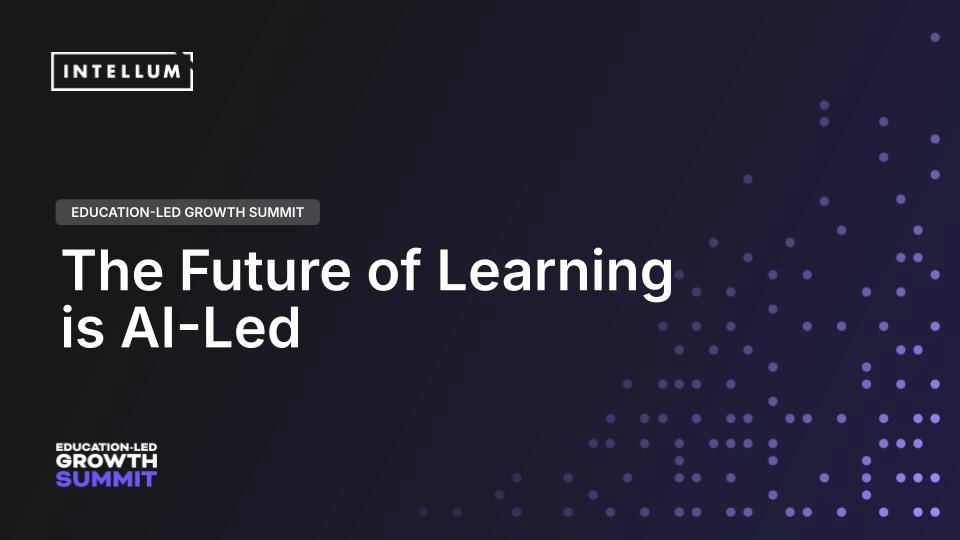It started with an experiment that surprised everyone.
Nearly eight years ago, the Intellum team staged what looked like an uncanny leap forward in artificial intelligence. Employees were invited into a room to meet “Ava,” a virtual tutor who asked about their background, adapted to their learning preferences, and guided them through a personalized learning journey. The experience felt so real that some walked out wide-eyed, convinced they had just spoken to a highly advanced AI. What they didn’t know at the time was that Ava was powered by voice actors and branching scripts—not machine learning.
That early experiment wasn’t just for kicks and giggles. It was designed to test how people would interact with a system that could anticipate their needs and respond in natural language. The reactions validated our leadership team’s belief that the future of learning would depend on AI that could reason, guide, and adapt.
From Decision Trees to Reasoning Models
Back then, most technology in learning platforms relied on deterministic rules: if a learner clicked this, then show that. As AI matured, the breakthrough came when models began demonstrating reasoning capabilities. This shift made it possible to move beyond static pathways and instead design tools that could understand intent, generate content, and adjust in real time.
But one principle has guided every step of our AI evolution: humans remain in control. We recognize that AI can accelerate work, but human oversight ensures that outputs are accurate, meaningful, and aligned with instructional design best practices. This partnership between human expertise and machine assistance has become the foundation of our approach.
Three AI Agents to Solve Real Problems
The next leap came when we realized that the three core personas in any education program—content creators, LMS admins, and learners—each faced distinct challenges. This insight led us to our current work developing three dedicated AI agents:
- The Creator Agent helps instructional designers and subject matter experts build courses faster. It drafts learning objectives, outlines lessons, generates assessments, and even creates content pages, all while giving the human expert full control to review and refine. Early users report time savings of up to 70%.
- The Manager Agent serves as the platform expert. It knows where every piece of data, menu, and component lives and how to interact with them. Instead of navigating complex menus or crafting SQL-style queries, admins can simply express their intent in natural language. The Manager Agent translates requests like “enroll all sales employees in certification due in 90 days” into the right actions and executes them seamlessly (with confirmation), delivering an automagical experience that makes administration effortless.serves as the platform expert. It knows where every piece of data, menu, and component lives and how to interact with them. Instead of navigating complex menus or crafting SQL-style queries, admins can simply express their intent in natural language. The Manager Agent translates requests like “enroll all sales employees in certification due in 90 days” into the right actions and executes them seamlessly (with confirmation), delivering an automagical experience that makes administration effortless.
- The Learner Agent personalizes education at scale. Acting as a persistent tutor, it “knows” where you are in the platform, tracks your progress and goals, and continuously adapts the experience to you. It can hold contextual conversations inside any piece of content or assessment results, recommend learning paths based on your background and history, and replace traditional search with conversational AI that surfaces answers from your available content and suggests the most relevant courses.
Each of these agents reflects our commitment to embedding intelligence directly into the workflow rather than offering bolt-on features.
A Platform Rebuilt for an AI-First Future
The development of AI agents pushed us to reimagine our platform architecture from the ground up. Rather than layering on standalone tools, we’re rebuilding with an AI-first foundation—so intelligence is woven into the platform itself, not bolted on.
This incremental approach means AI functionality is being introduced step by step across the platform, ensuring it can work seamlessly across the full learner and admin experience. Each release is tested and refined in partnership with customers to keep the technology grounded in real-world needs and measurable outcomes.
The Vision That Drives Us Forward
What started as an experiment with actors pretending to be AI has evolved into a strategy built on true intelligence, transparency, and human partnership. The Creator, Manager, and Learner Agents are not abstract ideas—they’re practical tools already transforming how organizations design, deliver, and manage education.
As AI continues to reshape industries, we believe its greatest potential lies in empowering people to do more with less, to personalize experiences at scale, and to turn education into a strategic lever for growth. The future of learning is not just AI-enabled. It is AI-led.





.png)

